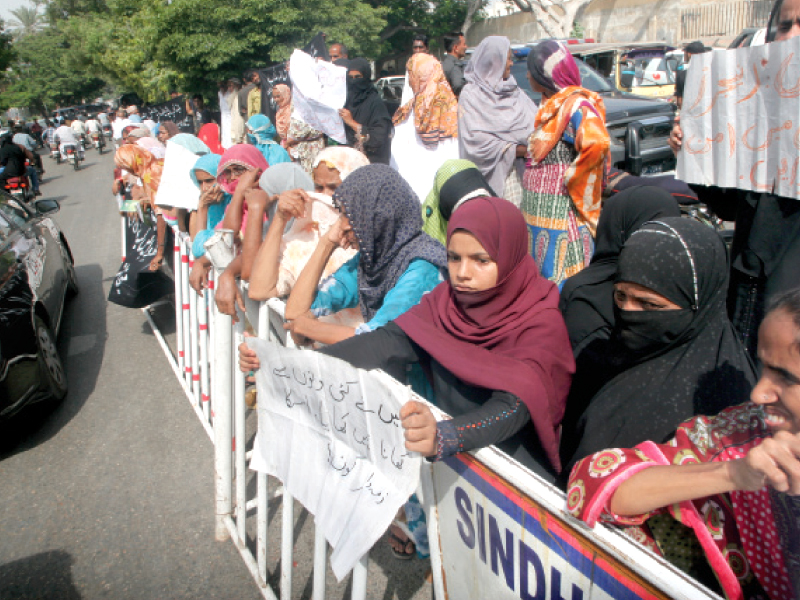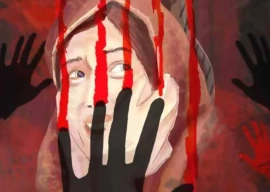
It appears that more the judges of the Supreme Court of Pakistan question the high-officials about steps taken to curb violence in the city, the more they fumble to come up with answers even close to satisfactory.
On Thursday, when the SC bench comprising Chief Justice Iftikhar Muhammad Chaudhry, Justice Jawwad S Khawaja, Justice Gulzar Ahmed, Justice Athar Saeed and Justice Sheikh Azmat Saeed, resumed the Karachi Law and Order suo motu implementation case, they were yet again surprised - and irritated - by the slow pace of the high-officials.
“Everyone is busy in securing their jobs instead of performing their duties and protecting the life and liberty of the poor citizens of the city,” said the CJ, while addressing the provincial chief secretary, inspector general of police and director-general of the Rangers.
1 down, 19 to go
The bench noted that its October 2011 detailed judgment contained orders for implementation on 20 issues, but only one was followed through.
Apart from the payment of compensation to the families of cops killed in the 1992 operation and of targeted lawyers, the other orders, including removal of no-go areas, de-politicisation of the police force, arresting target killers and ending extortion, were pending till today.
The bench noted with concern that Karachi continued to “bleed” while law enforcers seemed unable to control the situation.
When confronted, Sindh Chief secretary Muhammad Ijaz Chaudhry failed to show a single letter ever written by his office to the federal government seeking assistance for overcoming the lawlessness in the city.
The CJ warned the functionaries that a “very drastic” order would be passed against all of them for their failure, which was defaming the elected provincial government as well as the federal government.
The chief secretary told the court that his job was to ensure coordination among the government functionaries, adding that the home department has written to the federal government for providing assistance of the Federal Investigation Agency, National Database and Registration Authority, and National Aliens Registration Authority, to help the Sindh government deal with the issues of illegal migrants. His inability to produce any documents, however, led the judges to believe that he had in fact done nothing during his four-and-a-half-month tenure.
No improvement
As the judges turned to the Sindh IG Shahid Nadeem Baloch, they again expressed their bewilderment over how the official could claim improvement when there was no respite in targeted killings, no-go areas were still in existence and extortionists and kidnappers were roaming about. “Since October 2011, 4,952 people have been killed, mostly in targeted attacks, and the Sindh police chief still thinks there has been improvement?”
The IG was directed to submit a report as to how many police guards have been provided to escort the ministers, advisors and other political personalities in Sindh. This order was passed on an application filed by Sardar Mumtaz Bhutto, who alleged that law and order in Karachi was “shameful” while the police escorts politicians of the Pakistan Peoples Party.
Advocate-general Khalid Jawed Khan told the court that efforts were under way to protect life and property of the citizens and implement the apex court’s orders. The police force operates with the technical assistance of the Citizens-Police Liaison Committee (CPLC) in tracing crimes, particularly kidnappings for ransom, he said.
The judges observed that the CPLC should be brought under the legal cover since its existence and operations were not guarded by the statuary laws.
Published in The Express Tribune, August 30th, 2013.
COMMENTS (1)
Comments are moderated and generally will be posted if they are on-topic and not abusive.
For more information, please see our Comments FAQ

1731916090-0/sabrina-(3)1731916090-0-165x106.webp)


1732020599-0/BeFunky-collage-(73)1732020599-0-165x106.webp)












These matters are complex and cannot be resolved through court orders or by ridiculing the government functionaries. Court's interference will further deteriorate the situation. Its a game of politics and the judges will be well advised to stay away from it.